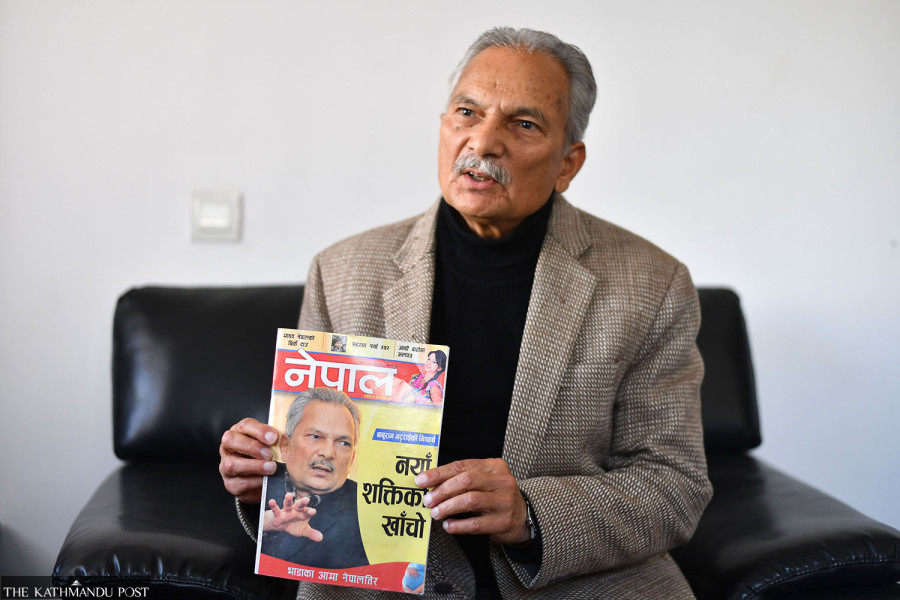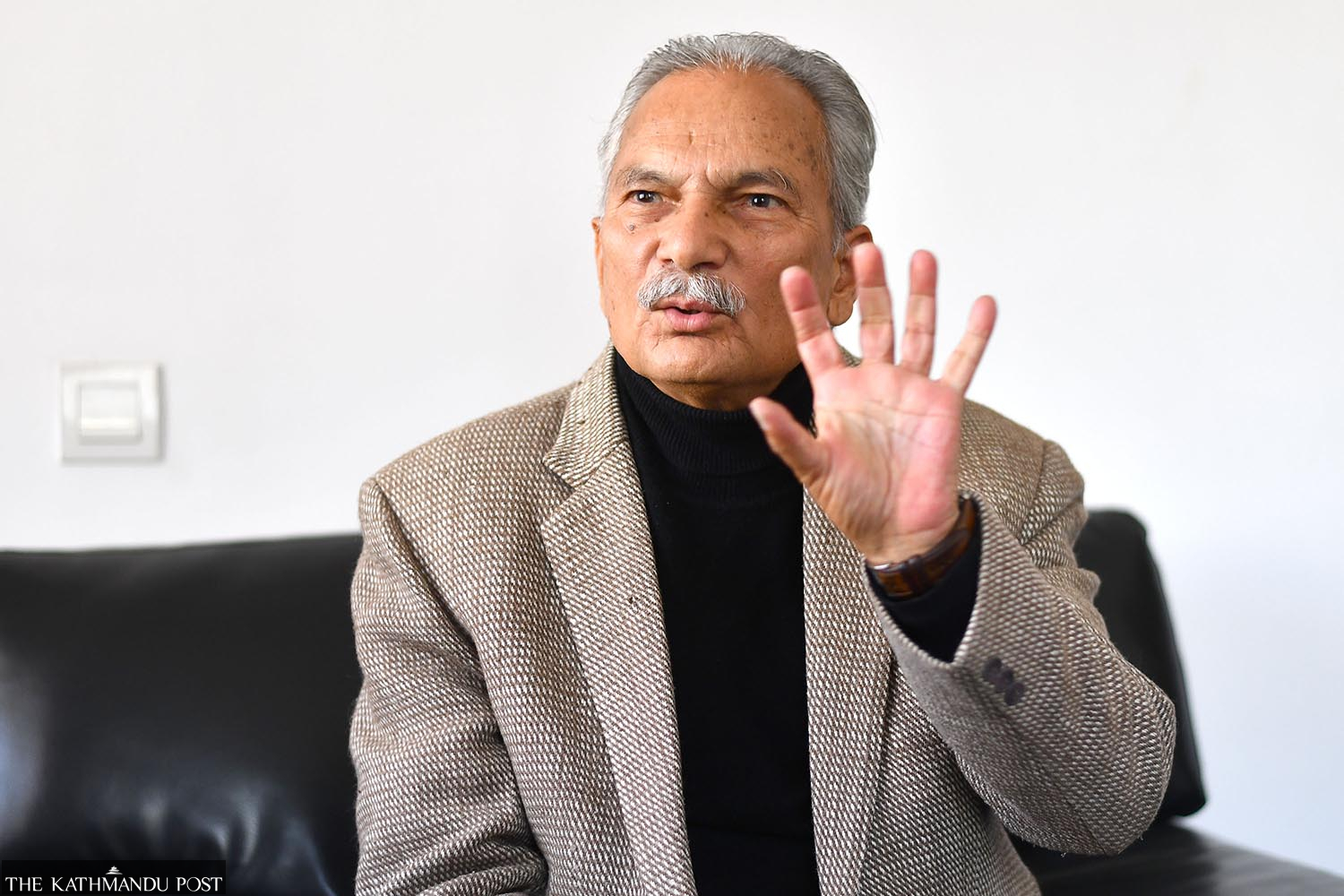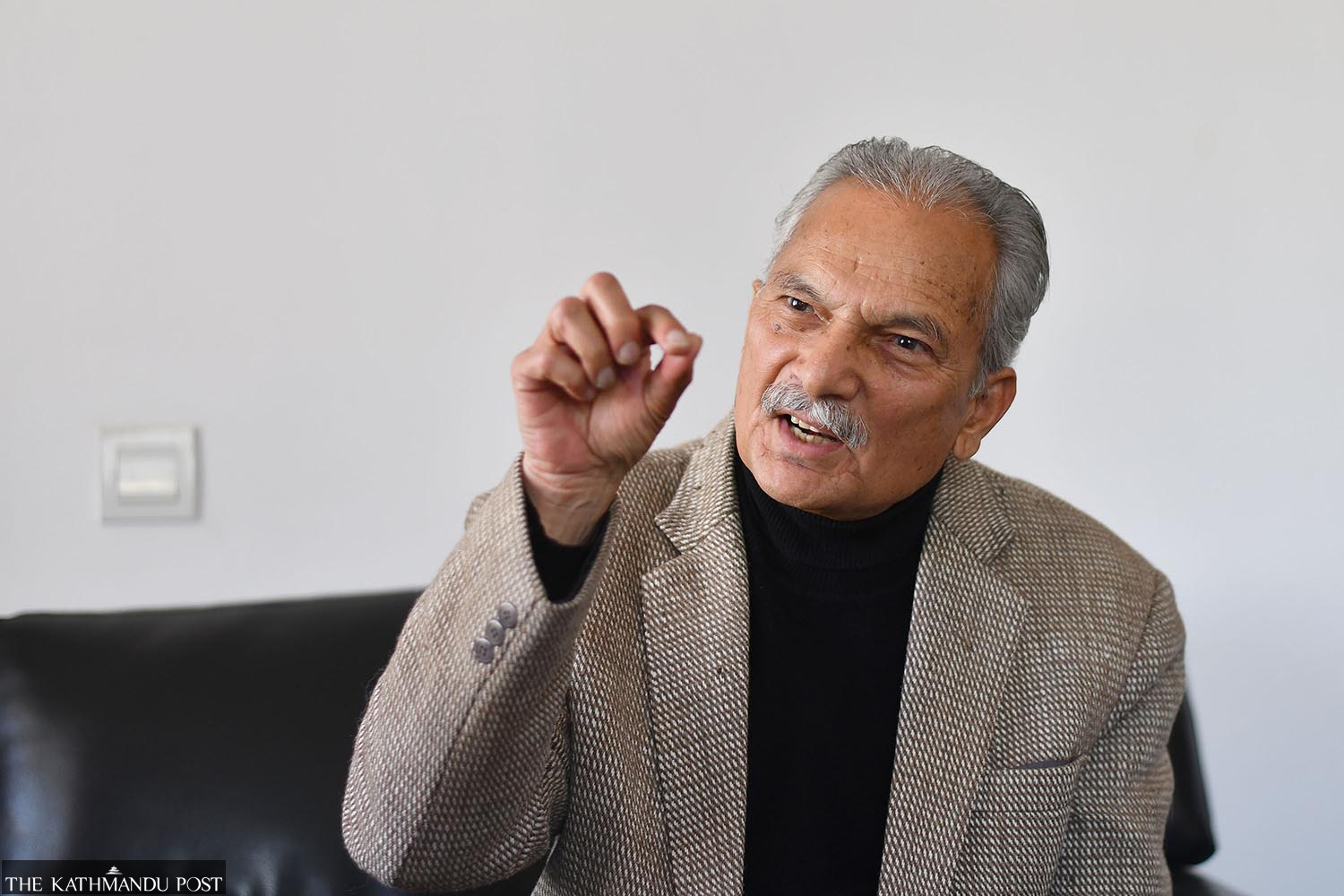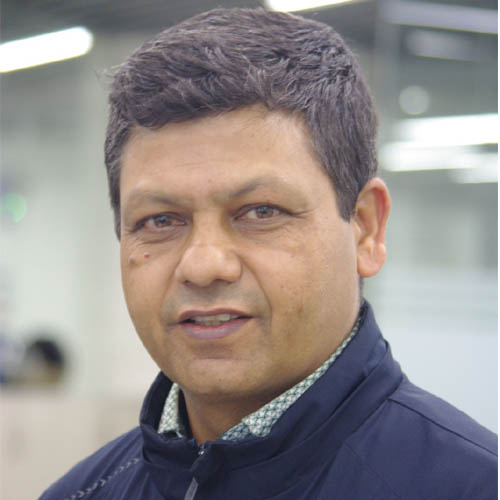Interviews
Repolarisation of alternative forces is the right way forward
Balendra Shah should be more open and transparent, interact with people and get involved in debates.
Thira Lal Bhusal
Baburam Bhattarai, the Nepal Samajwadi Party (Naya Shakti) chairman and former prime minister, used to be the second most powerful leader in the CPN (Maoist), which had waged an armed insurgency (1996-2006). After joining mainstream politics, he became a popular finance minister and later prime minister. Once a powerful leader, Bhattarai now leads a fringe party without a single seat in federal parliament. The Post’s Thira Lal Bhusal sat down with Bhattarai to discuss the dynamics of emergence of new political parties and his plans for a political comeback.
You quit the CPN (Maoist Centre) in 2015 vowing to form a new political force. In the past decade, you conducted several experiments in this regard but none of your efforts yielded desired results. How do you review your political journey of this period?
The idea of developing an alternative force was not just to form one more party. A political party is an organised force guided by a political ideology. If you study world politics, political parties emerge after epochal changes. Political parties in Europe and the US were established after major changes in the 17th and 18th centuries. In Nepal, political parties were formed after the end of the autocratic Rana regime during the 1950s, then 1990 and other important political changes.
Internationally it is said that the modern era that continued for the last couple of centuries completed its course in the twenty-first century and history has entered a new stage. So, globally traditional political parties formed centuries ago have lost their relevance. We find old parties struggling to prove their relevance in various countries. Parties in several third-world countries like ours were formed mostly after World War II. During the Cold War, they were mainly divided between the liberal democratic and communist camps. In Nepal, the Congress followed the liberal line and the communists embraced left orientation.
There is a global narrative that the world is entering the Fourth Industrial Revolution. I concluded that Nepal completed a political era and entered a new stage mainly after promulgation of the new constitution institutionalising the federal democratic republic system in 2015. After completing the political revolution, the next national task was to materialise economic transformation. Thus the country needed a new force to lead the country in the new era. I prefer to call it a post-capitalist era.
I floated the proposition of an alternative party in this larger context. The idea is becoming more relevant by the day. In fact, I wrote an article under the title of ‘Need for a new force’ which was published in Nepal magazine in March 2014. In the article, I proposed formation of such a force after promulgation of the new constitution. Though we have seen some trends of people trying to form new forces, they are isolated cases. For instance, some new outfits and independent individuals have emerged from elections but they aren’t organised. So it requires a holistic development. The Congress and communist forces that have expanded their organisations to the grassroots levels for decades are still strong.
The alternative force we want to form would be one step ahead of the liberal democracy and communism. I have been consistently pushing for the formation of such force but it has failed to get the shape and gather momentum. This is because it has still not gotten a complete ideological clarity even in the global context. Some term it as progressive democracy while some others say libertarian socialism while yet others call it participatory socialism.
We are for a socialism adhering to democratic principles and values. We need to work for further ideological clarity. Besides, a larger segment of our society is still unaware of changes as latest indicators show that over 7.2 million people are illiterate. Similar is the condition of poverty. So, the quest is a bit challenging.
You also joined ethnic identity-based and regional political forces with plans to turn them into big parties. But your efforts failed. What was the problem?
We have so many issues but there are five major problems. We changed the country’s political superstructure but the socio-economic base hasn’t changed. This is a major contradiction. Therefore, we have to concentrate all our energy on economic transformation. It should be the first agenda. Second, the form of governance we adopted in our constitution is inappropriate. We have to adopt a system that directly elects the President and chief ministers. And the federal parliament and provincial assemblies should be fully proportional but directly elected from cluster-based constituencies. We adopted federalism in principle but not in essence.
Nepal is a multilingual and multiethnic country. The spirit behind adopting the federal system was to allow ethnic communities to exercise identity-based rights in areas of their ancestral lands. We didn’t need just decentralisation because the country was decentralised into various regional, zonal, district and other units even under the Panchayat system. The failure to accept identity-based rights caused dissatisfaction in the society.
Therefore, our democracy and the federal system have failed to effectively function. Third is institutional corruption, which has emerged as a big challenge. Corruption carried with collusion of political parties and syndicates of middle men has posed a serious challenge in governance. Fourth is our complex geopolitics. Our trade deficit has been increasing since the Sugauli Treaty of 1816. We have remained an import-based country. We can’t progress unless we correct this trend. The fifth is our failure to adopt an ideological political system that is suitable for this age. We call it ‘Enhanced Socialism’.
In this larger scenario, addressing the ethnic identity-based issues is an important responsibility, which is stated even in the constitution. Therefore, we tried to connect the regional and ethnic identity-based parties but it couldn’t succeed. I still believe that we should connect them to make the federal republic system function and must be onboard the political system for the overall progress of the country. But the leaders from the regional and ethnic identity-based parties must rise from their narrow-minded approach.
Of late, you have increased your engagements with leaders from newer outfits such as the Rastriya Swatantra Party and those from Bibeksheel Sajha background as well as other individuals who are working independently. Are you planning any collaboration with them?
My first priority is to bring together those who had earlier organised and worked to build an alternative political force, who later scattered due to some confusions. Besides that, we are also in dialogue with friends from RSP, Bibeksheel-Sajha, and those who are working in local units after winning elections independently. Also, a number of people with their unique roles and identities in the Tarai-Madhes have contacted us. But there won’t be immediate unification as we need ideological clarity to become a political party. I find there is spirit in the newly emerged parties and groups to do something and the general public wants new forces. We are trying to build a well-organised political force.

Are you in dialogue with Kathmandu Mayor Balendra Shah? What is your impression of him?
There was interaction in the initial stage. Now there is no direct interaction. I am observing people’s curiosity about him. Basically youths seem impressed by him. I think he should be more open, transparent and interact with people and involve himself in debates. In a democracy, these are basic needs and that will be better for him. After all, one should have ideological and political clarity to give a better alternative to the country.
RSP has said it doesn’t want provinces in the present form. It has not even participated in provincial elections. Mayor Shah didn’t cast votes for provincial seats in the last elections. You are an advocate of a more effective federal system. How can you collaborate with them?
This is the reason there is a confusion [about collaboration]. My consistent view is that we have to work for the better but without rejecting the achievements that we have attained. We can’t make any compromises on the hard-earned achievements such as the policy of inclusion, secularism, federalism and democratic republic.
Do you think the grip of old parties can be easily broken?
Old forces should break up for the emergence of new ones. The debates within the major parties have intensified of late. These debates will further escalate.
There is a confusion about your role as well. Sometimes, you fiercely criticise CPN (Maoist Centre) chair Pushpa Kamal Dahal. Sometimes you inch closer to him. For instance, you even helped him to get elected as federal lawmaker from your own constituency. Based on that there were reports about reunification.
I have never used the word unity. I have used the word transformation. The old communist parties should transform themselves into democracy-based socialist parties. I am for enhanced socialism. The fundamental ideas of communism such as abolition of private property, dictatorship of proletariat, and centralised unitary state have become completely irrelevant. Both the CPN-UML and Maoist Centre have abandoned these ideas but they are cheating people by selling the communist brand. There is no point in giving continuity to a political party in the name of communism without following the aforementioned three fundamental ideas.
Both [CPN-UML chair KP Sharma] Oli and Dahal admit it but they say it is difficult to embrace a new system because cadres are trained as communist members and parties are structured accordingly. They don’t want to discard the communist brand. This practice of cheating the general mass in the name of communism should stop. My interactions and collaboration with Dahal were for making a socialist party.
Do you see any possibility of collaboration with Dahal in the days to come?
Not at all. I can’t collaborate with them because in politics leaders should have ideological clarity and ethics. They have become so corrupt. They are closely involved with compradors. The major source of the funding to run their political party is the income they make while awarding big contracts. Also, the top leaders work in collusion with external power centres to stay in power. So they can’t correct themselves. Thus I am in favour of working to develop a new force, not to collaborate with the old ones. Sometimes, I work with Dahal for a certain agenda such as to complete the remaining tasks of transitional justice, which is above partisan politics. That shouldn’t confuse people.
You rule out the possibility of joining hands with traditional leaders and parties seeing no chance of their transformation while new outfits lack ideological clarity. What will be your strategy in terms of collaboration and political alliance in the days to come?
My first conclusion is that there is no possibility of change in the country by collaborating with old parties. Even collaboration for certain purposes became counterproductive. For instance, I helped him [Dahal] get elected from my constituency but he later betrayed me. As far as our interactions with new outfits is concerned, first we have to be clear about our ideological line. Repolarisation of alternative forces is the appropriate way forward. This is the fundamental thing.
A section of people claim that the next general election is going to bring about a drastic change in Nepali polity. You travel widely and interact a lot with general people. What is your observation?
People desperately seek something new in politics. This is also an objective necessity as it is proven that these three big parties and three top leaders [Sher Bahadur Deuba, Oli and Dahal] who have repeatedly led the government for years have failed. So, people will conclude that they can’t deliver. But it is also true that there is a confusion about the alternative. We shouldn’t rush to form a political party without ideological clarity. But I think there might be a broad electoral front of alternative forces by the next election.

The front can work for good governance and prosperity while safeguarding the democratic federal republic system. Despite poverty and lack of education, our youths from across the country have gained huge international exposure while staying abroad for work and study. That may help us forge such an alliance and emerge as a decisive force by the next general election.
You have closely worked with Madhes-based leaders. How do you see the recent initiative of Madhes-centric leaders to form an alliance among themselves?
I recently travelled to various places in Madhes. There is public disenchantment with Madhesi leaders as they only engage in power games. I think this is a move taken out of desperation after sensing existential crisis. People will not be convinced even if the old leaders come together.
Once a powerful and popular leader, you are probably in the weakest situation of your entire political career. What is your plan to make a comeback?
I have undertaken a movement to develop a new and alternative political force. Looking at things personally is a faulty perspective. For instance, we are the ones who fought for an epochal change. We abolished a feudal autocratic system and institutionalised the federal democratic republic system in the country. The Maoist party led the movement and I was the one who championed the federal democratic line within the rebel communist party. So, you shouldn’t describe things only through the perspectives of immediate gains and numerical strength.
Laying a ground for a strong alternative force is vital at this stage and I am concentrating on that. I am working on a political document that reflects greater ideological clarity. I will be more than happy if I could end this confusion and set a clear path ahead for a new political force. I am not after gaining power because I have already become chief executive of the country.
What do you say about the Congress-UML coalition’s proposal to amend the constitution?
I have been describing this constitution as ‘a glass half full’ from the beginning. So a progressive amendment is definitely needed. But the Congress and UML aren’t for enriching the charter but to further weaken it through amendment. They blame the proportional representation electoral system for political instability. Their hidden intent is to drastically decrease the number of seats under the PR category and increase the number of first-past-the-post (FPTP) seats. And, they want to outlaw small parties from parliament by raising the threshold to secure PR seats.




 13.12°C Kathmandu
13.12°C Kathmandu




.jpg&w=200&height=120)







